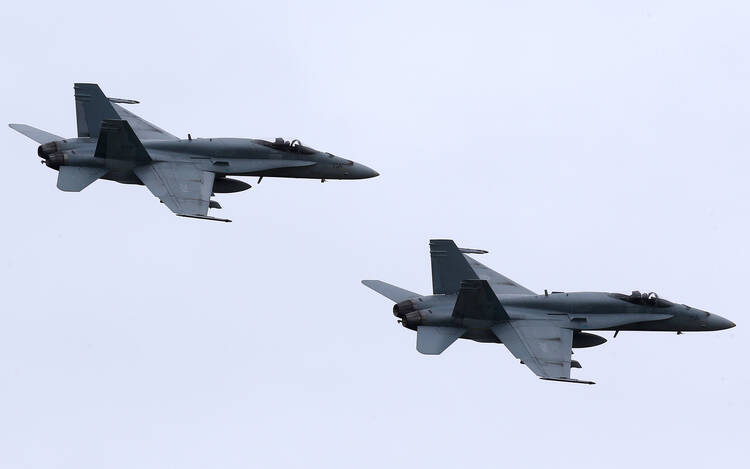For two major Catholic agencies based in Canada, the Liberal government's decision to stop airstrikes against Islamic State positions in the Middle East begs the question: How must Canada act in that region?
Shortly after his Oct. 19 election, Canadian Prime Minister Justin Trudeau announced his intention of pulling out of the U.S.-led airstrikes campaign against Islamic State positions in Iraq and Syria.
Carl Hetu, national director of the Canadian branch of the Catholic Near East Welfare Association, said "it was about time" for Canada to turn its back on the military approach.
"Needless to say, that military solutions rarely help to solve anything on the ground. What's more, Canada doesn't have any military power, whatsoever," adds Hetu.
"Since World War II, the Canadian Armed forces never made a difference in any conflict," Hetu said. He added that, in the last two decades, Canada distanced itself from its traditional peacekeeping role, with the Canadian military getting involved in a wide array of combat missions.
"The world has changed, it's now more complex and its violence is more concrete. What will be Canada's involvement in that new reality?" Hetu asked.
Some Christians are hesitant about Canada's decision to pull out of the bombing campaigns against Islamic State. On social media, some people argued that Canada's newly elect prime minister had "abandoned" the Middle Eastern Christians to their fate.
"That's utterly false," Hetu said. "Militarily speaking, we shouldn't be involved there, in the first place. It's pure nonsense to think that we'll be able to make a difference through military action. The only viable solution and the only way to make a difference is through a ground-breaking diplomacy that will find new ways, new strategies to bring peace and stability in the Middle East.
"Yes, it's complex and complicated. But it's much better than war. War is never an alternative. We must turn our back on our warmongering habits, and work harder toward peace habits," said Hetu.
Marie-Claude Lalonde, the national director of Aid to the Church in Need, was not as categorical as Hetu.
"As a Catholic, I'm of course opposed to war," said Lalonde.
"However, what are the alternatives? Are we really willing to let things get worse than they are today?" she asked as she reflected on the atrocities committed by Islamic State fighters in Iraq and Syria.
Aid to the Church in Need never officially took a position about the legality or the morality of airstrikes against Islamic State, and Lalonde said the agency's partners in the Middle East are unable to evaluate the actual efficiency of the strikes.
When questioned about what could be the best possible policy for Canada in Middle East -- should Canada continue bombing Islamic State positions or, instead, open its borders to refugees -- Lalonde replied, "None of the above."
"If they were offered a true alternative, those people would happily stay in their native homeland. Opening our borders so that thousands of refugees may settle in Canada is, of course, a generous initiative. Unfortunately, it's not enough: Some people won't be able to leave, especially the poor, the sick, the elderly, the women or the young children," she said.
Trudeau would like Canada to welcome an extra 25,000 Syrian refugees by the end of the year. Earlier this year, Canadian churches asked Canada to welcome an extra 10,000 refugees from the Middle East.








